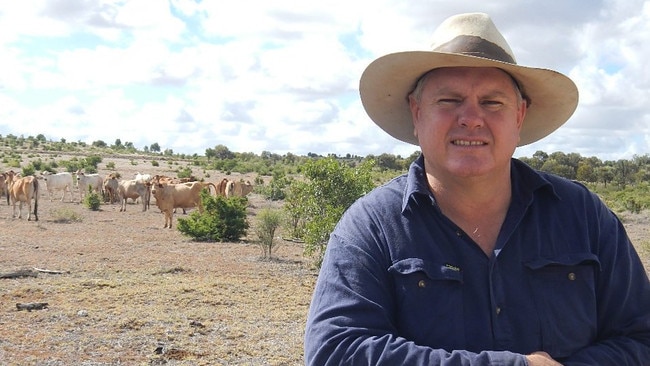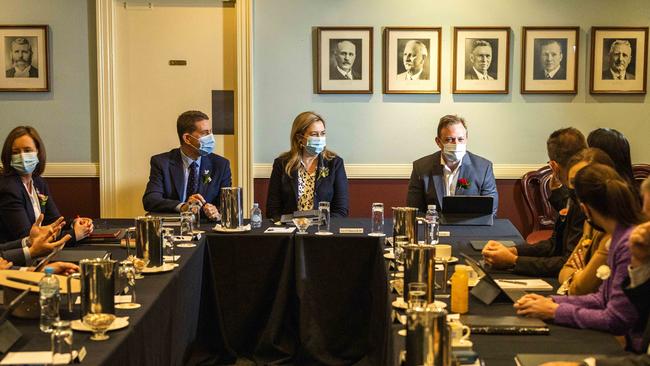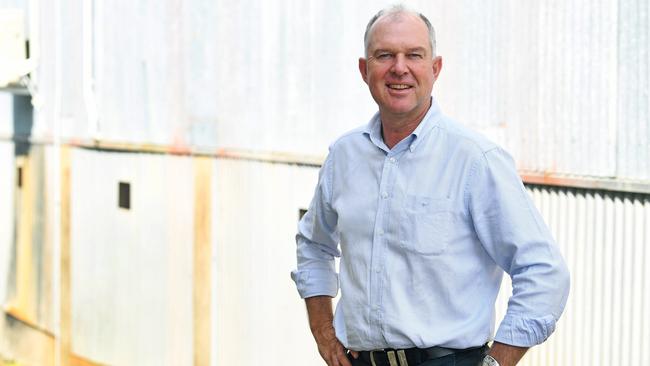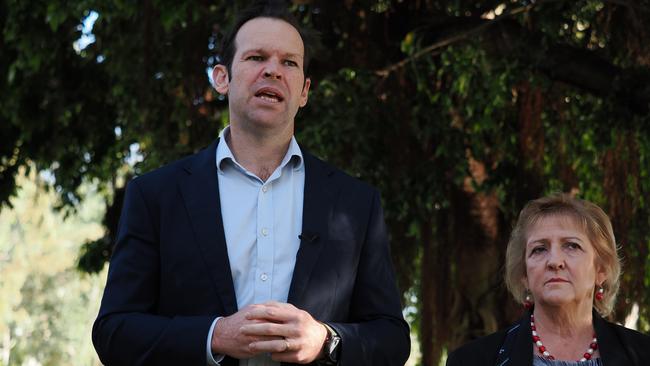Clarke Creek grazier David Hill talks about CQ risk of lumpy skin disease, foot and mouth disease
There’s nowhere in the world that processes cattle quite like the beef capital, but if one of two livestock diseases reach our shores it could cause “utter devastation” to the industry that underpins the region. Here’s how.
Business
Don't miss out on the headlines from Business. Followed categories will be added to My News.
It is the industry Rockhampton and Central Queensland is famous for, but the region’s cattle farmers are on tenterhooks as two diseases threaten their livestock.
For months farmers around the country have been worried about Lumpy Skin Disease (LSD), but now the threat of Foot and Mouth disease (FMD) with incursions in a northern neighbouring country.
But while the threat of FMD grows as the risk of spread across Indonesia, the threat of LSD is still worrying farmers.
David Hill is a cattle farmer from Clarke Creek between Mackay and Rockhampton, is a director on the cattle board of AgForce and also on the policy council Cattle Council of Australia.
He said an incursion of FMD or LSD would cause “utter devastation” for Central Queensland’s beef and agricultural sector.

“It would totally devastate a large part of Central Queensland with it being a production and processing intensive area for beef production,” he said.
“Comparatively, globally you wouldn’t find too many areas would produce stock the way CQ does.
“It would affect not just our industry and supply chain, but the services that rely on the beef industry for their livelihoods and small communities that are beef towns.”
Mr Hill said how an incursion of FMD or LSD was managed varied from state to state, but in Queensland if FMD was detected it would trigger a “total lockdown”.
“It would be based on the AusVet plan, which would trigger a 72 hour total lockdown for affected species,” he said.
“Traceability systems would be initial indicator of how widespread the threat could be.
“The Chief Veterinary Officers are working closely to map about different scenarios.
“FMD has an up to, 14 day incubation period so some animals can become infected but won’t show signs for up to 14 days, LSD has an incubation of period of up to 28 days.”
Mr Hill said a “buffer zone” appropriate to the disease would then be set up around the infected and neighbouring properties.
But while threat level of FMD had been raised, he said producers needed to be mindful the threat of an LSD incursion was of a higher level.
He says the scary thing about LSD is the fact it is spread through biting insects such as mosquitoes, some species of fly and possibly ticks.

Mr Hill has been working with industry bodies and the government on the management for if an outbreak were to occur in Australia.
He said he was supportive of the steps the Federal Government had already taken to help Indonesia with its outbreaks and the screening done at airports.
“For me as a producer I’m very, very supportive of the support the government and agencies have given to Indonesia with outbreaks and the increased screenings done at airports, and the roll out of foot mats at all international airports,” he said.
“We remain supportive of all additional measures the government has done to reduce the threat, but we would want decisions to be made on the best available science of risk assessment.
“We’ve managed to keep the disease out of Australia for about 120 years now. The threat level will increase though if it does get to Papua New Guinea which is something we don’t to see.
“People have travelled to countries when they’ve had incursions and a number of people go to Indonesia and Bali which are a closer proximity to our country, but the heightened risk has also seen a heightened response and more screening.”
On Monday Premier Annastacia Palaszczuk announced the government would recruit a specialised squad of trained biosecurity officers to boost frontline defences against FMD and LSD.
Meeting at the Ekka, cabinet was briefed on a more than $20 million package of initiatives which included 15 new staff.
“At least $7 million will go to recruit and train a dedicated team of 10 new biosecurity officers,” she said.
“They will be skilled in disease protection strategies and specialised emergency responses.
“Getting these frontline officers strategically located throughout rural and regional Queensland is a top priority.”

Agricultural Industry Development and Fisheries Minister Mark Furner said while there were no cases of FMD or LSD in Queensland, people shouldn’t be complacent.
“We are supporting and working hand-in-hand with our Federal counterparts to protect Queensland and the nation’s livestock industries, and we are in regular contact with key industry stakeholder groups to provide support and information,” he said.
“While our ongoing investment in emergency animal disease preparedness positions us to effectively deal with any outbreaks, I encourage livestock owners to be prepared, vigilant and on the lookout for LSD, FMD, and ASF and ramp up their biosecurity practices.”
Opposition spokesman for agriculture Tony Perrett accused the government of being “habitually slow” to act on biosecurity issues.
“The Premier and the Agriculture Minister have been habitually slow to act on biosecurity issues and the department has been underfunded and understaffed on their watch,” he said.
“An outbreak of foot and mouth disease would be catastrophic with wide-reaching effects to our agricultural industries, and rural and regional communities.”
Capricornia MP Michelle Landry welcomed the State Government’s $20 million announcement to support Queensland’s biosecurity, but questioned the delay.
“I was pleased to hear the Queensland State Government is putting $22 million towards more biosecurity and more officers, I think it’s a good move but why has it taken so long?” she said.

“The farming sector is extremely concerned about this, and mum and dads are concerned about this too.”
On Wednesday a senate inquiry, held by the Rural and Regional Affairs and Transport References Committee which is chaired by Queensland Senator Matt Canavan, kicked off which would have a major focus on the risks of FMD.
Mr Canavan said the inquiry was all about keeping “our clean, green agricultural image” so Australia could continue exporting to the world and creating jobs.
“If FMD was to get out, it would have a catastrophic impact on the cattle industry in our country, at least equivalent to the covid lockdowns,” he said.
“It would be an $80 billion hit to our economy, $50 billion of that would be on the beef industry, so being the Beef Capital here in Rockhampton a FMD outbreak would hit us harder than anywhere else in the country.
“That’s why we have to be super vigilant now to make sure our good biosecurity system is maintained and we’re doing everything we can to keep this out. Because it is much better to be safe, rather than sorry.”
Mr Canavan said during the inquiry he would be making sure the boots are actually on the ground at airports to stop the disease getting into the country.
“Later on in the inquiry we want to hear from industry about what more can be done and to make sure we’re resourced to respond if the worst was to happen,” he said.
“We will be taking some hearings of this inquiry out to the regions and I’m certainly pushing for one in Rocky, I think as the beef capital we have a good case get a hearing here.”
Earlier this week Federal Agriculture Minister Murray Watt held a meeting with agriculture ministers from all states and territories in Australia.
At the meeting ministers agreed in-principle to progress work on a national approach to Australia’s livestock traceability systems, as well as finalising a National Biosecurity Strategy.
“It’s clear biosecurity is quite rightly top of mind for everyone. Threats of foot and mouth disease, lumpy skin disease and varroa mite reinforces the importance of a strong, shared biosecurity effort, because incursions don’t stop at our borders,” he said.
“As a result, we have agreed on pathways to deliver a national framework to improve biosecurity, through more traceability and a new national strategy.
“I feel confident that by having the Federal Government working cooperatively with all states and territory governments, we will deliver on measures that benefit the agriculture sector.”




